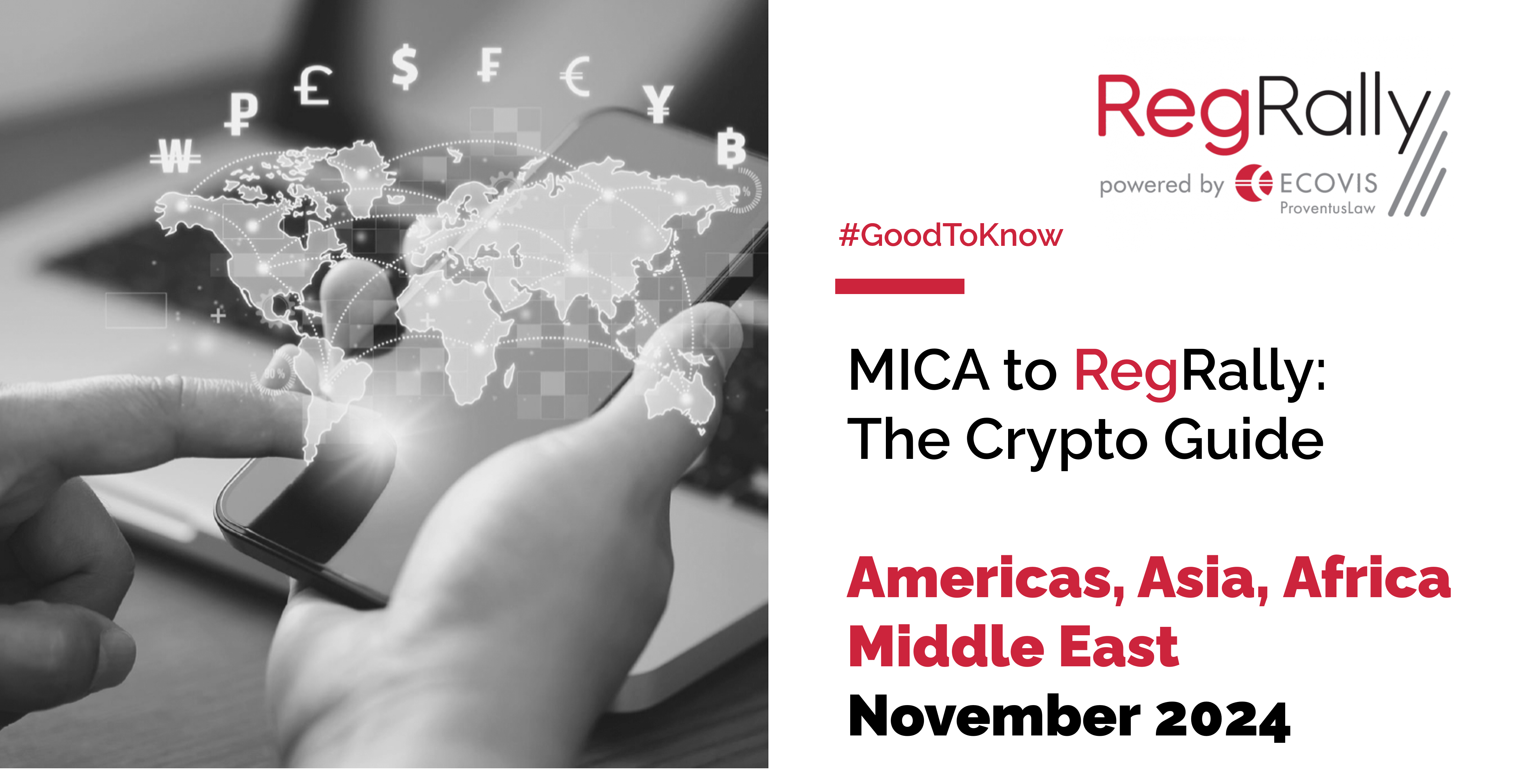ECOVIS ProventusLaw brings you a curated selection of significant developments from the crypto regulatory landscape in North, Central and South Americas, Africa and Asia in November 2024.
AMERICAS
Judge finds new California election deepfake ban unconstitutional
A federal court judge issued a preliminary injunction against a two-week-old California law that effectively bans election-related deepfakes. The law — AB 2839 — allowed any person to sue for damages over AI deepfakes within 120 days of an election and up to 60 days after if the perpetrator’s post resembled a political candidate. Judge John A. Mendez said artificial intelligence and deepfakes pose significant risks but ruled that the law was “unconstitutional” as it likely violated the First Amendment. Read more.
Eighteen Individuals and Entities Charged in International Operation Targeting Widespread Fraud and Manipulation in the Crypto-asset Markets
First-ever criminal charges against financial services firms for market manipulation and “wash trading” in the crypto-asset industry. Eighteen individuals and entities have been charged for widespread fraud and manipulation in the crypto-asset markets. Read more.
Governments must tax or ban Bitcoin to maintain deficits: Minneapolis Fed
A recent research paper by the Federal Reserve Bank of Minneapolis suggests that assets such as Bitcoin should be taxed or banned to help governments maintain deficits. Read more.
Argentina’s CNV proposes new regulations for virtual asset service providers
Argentina’s National Securities Commission (CNV) has proposed a new regulatory framework for Virtual Asset Service Providers opening a 30-day public consultation period. Read more.
Brazil tests DeFi elements, compatibility in Drex CBDC pilot
Brazil’s central bank is developing a synthetic central bank digital currency that blends decentralization, privacy and programmability. Brazil is incorporating decentralized finance (DeFi) principles into its development of an in-house “synthetic” central bank digital currency (CBDC), Drex, which was previously called the Brazilian digital real. Read more.
Ripple and Mercado Bitcoin Partner to Transform Crypto-Enabled Cross-Border Payments in Brazil
Mercado Bitcoin, Latin America’s largest crypto-asset exchange, will be the first customer in Brazil to utilize Ripple’s managed end-to-end payments solution, which enables businesses to easily leverage blockchain for faster, cheaper, more efficient cross-border payments in a secure manner. Read more.
AI-powered bot stands in for absent candidate in Virginia debate
United States congressional candidate for Virginia Bentley Hensel used an AI chatbot, “DonBot,” in place of opponent Don Beyer in a debate, highlighting AI’s increasing role in politics. Read more.
ASIA
Indonesia Extends Deadline for Crypto Exchange License Requirements Following Regulatory Updates
Indonesia’s Commodity Futures Trading Regulatory Agency (Bappebti) has extended the deadline for crypto exchanges to meet licensing requirements to become Physical Crypto Asset Traders until the last week of November. Read more.
Hong Kong issues dual-track policy for AI adoption in finance
The Hong Kong Financial Services and Treasury Bureau (FSTB) issued policies for the financial services industry focusing on efficiency, security and customer service improvements to ensure the responsible use of artificial intelligence. Read more.
Vietnam officially issued national blockchain strategy
October 22, Government issued Decision No. 1236/QD-TTg promulgating the National Strategy on application and development of Blockchain technology to 2025, with a vision to 2030. According to the Strategy and Vision to 2030, Vietnam will become a leading country in the region and have an international position in researching, deploying, applying and exploiting Blockchain technology. Read more.
Taiwan’s FSC drafts new crypto AML rules, requiring firms to register or face jail time
Taiwan’s financial regulator, the Financial Supervisory Commission, has drafted new anti-money laundering regulations following amendments made to the laws in July. These regulations require crypto-asset firms to register by the end of September next year. Non-compliance may lead to penalties, including imprisonment for up to two years. Read more.
Federal Law of 25.10.2024 No 349-FZ
“On Amendments to Certain Legislative Acts of the Russian Federation”
Federal Law No. 349-FZ introduces new regulatory measures for non-profit organizations (NPOs) in Russia, specifically targeting those involved with endowment capital. It mandates an audit of annual financial statements if the endowment capital’s book value exceeds 20 million rubles at the end of the fiscal year. Additionally, NPOs receiving real estate for endowment must transfer it to trust management within 60 days, and the government is now empowered to restrict digital currency mining in certain regions and define the conditions for such restrictions. This law takes effect on November 1, 2024, with some provisions delayed. Read more.
AFRICA
Uruguay Passes Crypto-asset Law
Proposed over two years ago, the law recognizes crypto-asset as virtual assets in the country, establishing the Central Bank of Uruguay as the regulator and overseer of companies seeking to offer crypto-asset services. The law positions Uruguay at the forefront of Latin American countries that have already included crypto in their regulatory frameworks. Read more.
SARS Warns About Crypto-asset Compliance
The South African Revenue Service (SARS) has noted the phenomenal growth of the use of various digital currencies by many South Africans. Prominent amongst these is the prevalence of crypto-assets. A staggering number of more than 5.8m South Africans hold a crypto-assets, with Southern Africa boasting the largest uptake of Bitcoin in the world. Read more.
MIDDLE EAST
UAE exempts crypto transfers, conversion from value-added tax
The UAE has exempted crypto-asset transfers and conversions from value-added tax, positioning itself as a more crypto-friendly jurisdiction for digital asset transactions. The amendments are implemented following Cabinet Decision No. (100) of 2024 and are effective from 15 November 2024. Read more.
Dubai’s crypto regulator cracks down on unlicensed firms
Dubai’s crypto regulator has initiated a crackdown on unregulated crypto companies and firms violating its marketing rules. Dubai’s Virtual Assets Regulatory Authority (VARA) issued fines and cease-and-desist orders to seven businesses for breaching marketing regulations and operating without required licenses. Read more.


 Newsletter Subscription
Newsletter Subscription